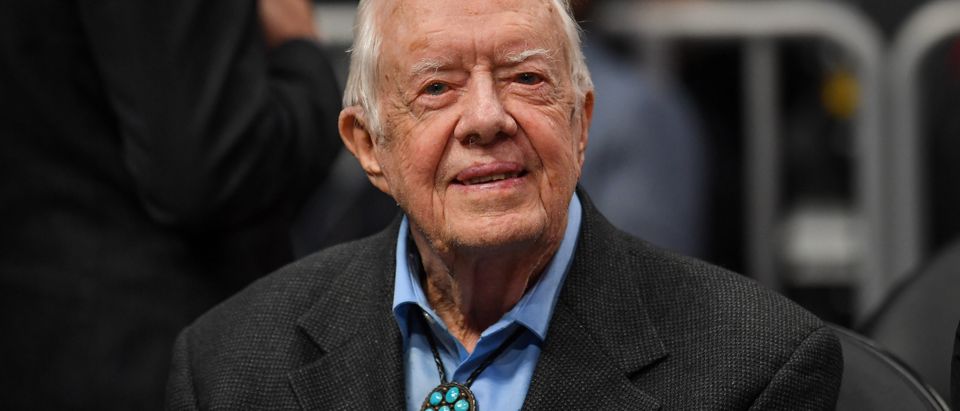Most American presidents are reelected. Our history suggests that incumbents enjoy, and successfully exploit, the powers of incumbency. Exceptions, however, exist.
Jimmy Carter, an obscure Georgia peanut farmer and governor, was elected two years after Richard Nixon‘s resignation and subsequent pardon by Gerald Ford. While Carter lacked national experience, his 1976 campaign rhetoric offered a timely, clear and persuasive contrast with Nixon’s shiftiness and criminality. After Watergate, Carter was a political palate cleanser for the nation,
Two years or so into the Carter presidency, however, the “peanut farmer” schtick grew tiresome. Americans didn‘t appreciate lectures about wearing cardigan sweaters in the winter and turning thermostats up or down depending on the season. While Carter liked micromanaging access to the White House tennis court, he couldn’t manage to stop inflation, reduce high (18 percent) interest rates or tame Iranian ayatollahs.
When Iranian revolutionaries stormed the U.S. Embassy in Tehran in November 1979 and then held 52 Americans hostage for some 444 days, Carter‘s presidency effectively ended. His ill fated hostage rescue attempt produced an embarrassing Iranian-desert helicopter crash. Carter appeared weak and indecisive; so did the country. Ronald Reagan trounced him in 1980.
I worked for President George H.W. Bush, another modern one–termer. Bush was the first vice president to succeed his predecessor to the presidency by election since Martin Van Buren in 1837, and was exceptionally well-prepared for the presidency: war hero; former Congressman, GOP chairman, and CIA Director; America’s first envoy to Communist China; and Reagan‘s understudy for eight years.
When it came to using American military force and diplomacy, Bush was no Carter. He masterfully handled the Cold War’s end and forged an international coalition to counter Saddam Hussein‘s August 1990 Kuwait invasion. By early 1991, Bush had dispatched some 500,000 soldiers half–way across the world and routed Hussein in a few weeks with few casualties. By late winter 1991, his approval rating reached 90 percent.
Twenty months later, in November 1992, Bush won 38 percent of the popular vote and lost the presidency to Bill Clinton, another low–profile southern governor with zero federal government and military experience. Why did this happen?
Bush‘s White House and election team took his reelection for granted: with 90 percent approval after the Persian Gulf War, how could he lose?
Bush was widely perceived as not caring about domestic policy. His belated response to the Los Angeles riots following the March 1992 Rodney King police brutality verdict made him seem out–of-touch. In one speech, Bush mistakenly read aloud what was meant to be a marginal cue: “Message: 1 care.” Message: I don‘t care.
From July 1990 through March 1991, the U.S. economy experienced a short, relatively mild recession that had technically ended well before election day. Given economic lag effects, the country didn’t perceive the economic uptick until early 1993, in the new Clinton administration.
What are the lessons for President Trump, who now trails his Democratic rival by double digits according to some polls?
Trump faces extremely strong headwinds: the coronavirus pandemic, unemployment and racial tensions.
Until the virus struck, the U.S. economy was the world‘s strongest, and Trump deserves credit for most of the positive indicators. He didn‘t create the pandemic and the resulting job losses. Nonetheless, presidents receive praise or blame for whatever happens on their watch, rightly or wrongly.
George Floyd’s brutal killing sparked understandable police brutality protests that evolved into broader claims about American race relations and inequality. While many of the protesters are sincere, the violence is unacceptable. The continued unrest, however, will have implications for November‘s voter turnout.
Trump’s problem, like Carter’s, is his leadership. Where Carter was feckless, Trump is reckless.
Trump makes predictions based on gut feelings, not evidence (the virus will end by April). He suggests stupid things (ingesting disinfectant). He undercuts his own message and key advisers (belittling Anthony Fauci). He tweets about unrelated matters (Bubba and NASCAR). More Americans are rolling their eyes and tuning him out.
To avoid becoming a Republican Jimmy Carter, Trump must practice and enforce message discipline, explain what he’d do with a second term, and connect with voters beyond his base. His actions and words must be clear about the pandemic, the economy and race relations.
Trump believes that his base, plus the possibility of some “silent majority” uprising, will again bring him victory in key states like Florida, North Carolina, Pennsylvania, Ohio, Michigan and Wisconsin. That‘s wishful thinking until he realizes that today‘s pandemic is, in effect, his own hostage crisis.
Charles Kolb served as Deputy Assistant to the President for Domestic Policy from 1990-1992 in the George H.W. Bush White House


